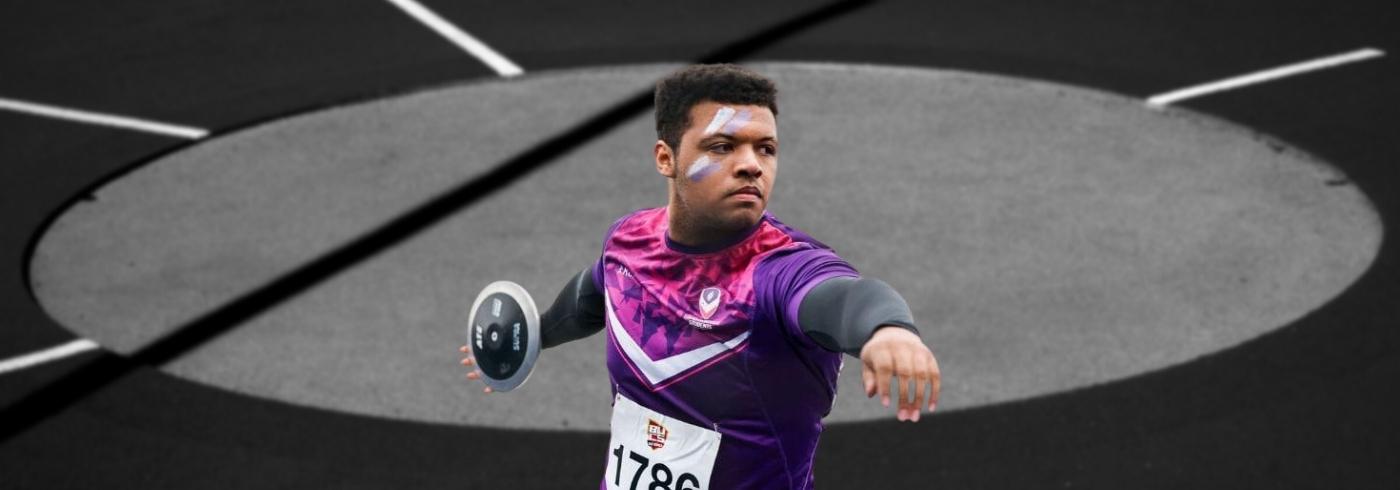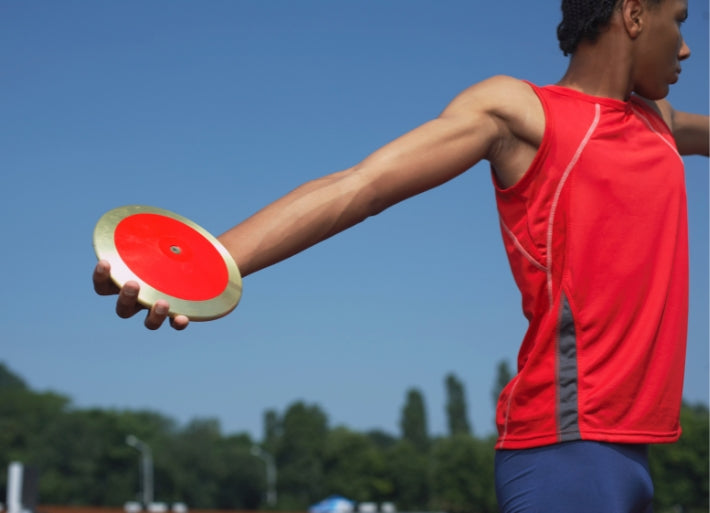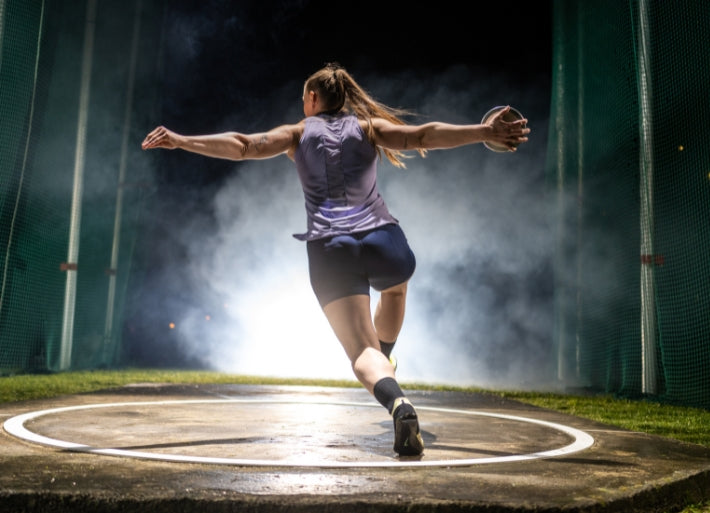
Discus Throw: Things I Wish I Knew
BY JOSH DOUGLAS
Welcome back to another one of my blogs!
This time, I will be going through examples of things I wish I knew when I started my athletics journey. While I am grateful for the lessons athletics has taught me, there are definitely some things I wish I knew when I was younger. I hope that by reflecting on this, someone that reads this may not have to go through the same hard lessons I did as I went up the ranks.
TALENT ONLY GETS YOU SO FAR

TRAINING AND WORKING HARD AS A DISCUS THROWER
One of the hardest pills to swallow is that no matter how good you think you are, talent will only ever get you so far.
Many athletes I've known in the U20 age groups and below were fantastic with the lighter weights but dropped off when the implement weight went up. I remember thinking at one stage that I was great at the sport, allowing my initial talent for throwing to replace hard work. Eventually, however, as the weight got heavier and heavier, my ego took on more and more damage.
Nowadays, I’m a lot more humble, sometimes to the point of being unhealthily pessimistic. Try not to be all doom and gloom, appreciate every high point in your throwing career, but recognise that this sport requires hard work. By acknowledging that your talent is not entirely responsible for your future achievements, you can either make changes to ensure you're always trying your best or make plans for the future once your talent has taken you as far as possible. There is no substitute for hard work!
BEING PREPARED FOR INJURIES IS KEY

INJURY PREVENTION FOR THROWS ATHLETES
Whatever sporting journey you embark upon will inevitably be hard. But, by researching the most common injuries of today, you can be better prepared for them. Athletes constantly try to improve themselves, although this makes the risk of injuries more likely.
Most sports are vulnerable to certain types of injuries. Javelin throwers, for example, tend to have elbow and rotator cuff issues, whereas hammer throwers tend to incur problems linking with their back. If I researched what injuries discus throwers tend to have, I could have prepared myself better physically and potentially prevented my injuries from occurring.
I'd advise any athlete starting or currently partaking in throwing to understand what stress throwing places on their bodies and curate a plan to strengthen those areas.
EVERYONE PROGRESSES DIFFERENTLY

IMPROVING TECHNIQUE AS A DISCUS THROWER
With social media constantly being in our faces, it's very easy to gain insight into other athletes' performances across the globe.
This exposure can hurt our egos as we may discover athletes the same age as ourselves performing at much higher levels. The world is an enormous place, and as a younger athlete, I still had not grasped that there would always be someone better. When I found out these other athletes were doing better than myself, I would either come up with excuses or double down on my training, which more often than not would lead to injury.
If you're determined to improve, your journey may be slightly longer and harder than others, but that doesn't mean your effort has all been for nought.
BEING REALISTIC ABOUT ABOUT EXPECTATIONS

PREPARING AHEAD FOR BETTER THROWS
When competing, we tend to expect and demand the best of ourselves. This expectation comes from a place of blind optimism and is often unrealistic as we ignore varying factors that play a massive role in our performances.
As a younger athlete, if I had an awful throw at a competition, this was the end of the road for me where that event was concerned. I would base my one throw as a predictor for the entire competition, leaving me very stressed. Throwing can be complex, and with that complexity comes the chance that you might not throw what you believe to be your best all the time.
By lowering your expectations slightly or giving yourself a minimum target, you place a lot less pressure on yourself. If I had the mindset I have now, it would have meant less stress for me and my parents, who also had to deal with my emotions on the car ride home.
REACHING YOUR PEAK AS A THROWER
PEAK PERFORMANCE IN DISCUS THROW
When I started throwing, I wanted success there and then. I was impatient, which led to me suffering mentally and physically as I would push myself too hard. If I wasn't improving each session, then what was the point of even trying?
Athletes can compete in throwing for years and years. These events, however, are not like sprinting, where you hit your sporting limit around your mid-twenties. Some throwers, in fact, continue competing at a high level into their 30's. I remember the first year in which I barely improved by a couple of metres, and I was heartbroken. I genuinely considered quitting and believed I had plateaued already.
I feel like if I understood how long I had to be the best thrower I could be, I wouldn't have put myself under so much unnecessary pressure when I was younger.
THE IMPORTANCE OF MENTAL HEALTH
PSYCHOLOGICAL ASPECTS OF THROWING
Throwing is just as mentally demanding as it is physically. The pressures we experience in this sport (externally and internally) can make or break you. When I started out, I got in my own head so easily and it's still something I'm working on. Saying this, I'm much better now than I once was.
For example, if it rained, my warm-up throws were poor, or the circle wasn't great, I started to crumble. There are so many things that we as athletes put up with in competitions, and whilst they undeniably have an effect on our performance, we can determine how much it affects us mentally.
If you're mentally struggling when you compete, reach out to family, your coach or even other athletes to see if they can help you. If that doesn't work, plenty of free online services (e.g. theathleteplace) that may provide tips for dealing with these issues are also available.
RETURNING TO THROWING AFTER A BREAK
GETTING BACK TO BEING ATHLETIC
This is a big one for me as multiple times I have taken time away from the sport and returned with the same intensity as I left, which has led to an injury.
Looking back, it makes complete sense, but you should lower your training intensity when you return. When you come back from your break, all you will want to do is catch up. Whether I was ill or there was another reason for my absence, I would feel bad every day when I wasn't training. I felt like I was falling behind and needed to try just as hard (if not harder) when I could train again. Ultimately, this mindset led to multiple injuries, extending my return to training even further than it should have been.
I would advise athletes who have had a week or two off of training to drop the weights when they return, lower the number of throws they usually do in a training session, and gradually build back up over a few weeks. I am still at the age where I recover from injuries relatively quickly. However, if I hadn't learned this lesson and carried it into my senior career, this could have negatively impacted my training.

THE IMPACT OF ATHLETICS ON YOUR LIFE
On a slightly more positive note, I have gained many things from participating in athletics. So many things, in fact, that I wish I started sooner.
I am part of a community of amazing people who are not just trying to push themselves but support others where they can. I hope to have the friends I have made from athletics for life. That's how much they mean to me.
People I used to compete with are now some of my closest friends, and I am grateful for all that this sport has given me. This may just be my biased option, but those who compete in the throwing events are some of the friendliest people I have met. Even those I would be competing against for medals cheer me on, and it is honestly such a great environment. Athletics is so much more than just throwing further than another athlete. It's a community, and one that I wish I joined sooner.
A FINAL NOTE...
While there are so many more things that I could have mentioned in this blog, these are the points that I feel will be most beneficial for others to read about and take notes on.
I still have so much to learn myself, and I think there isn't anything wrong with knowing what other athletes have learnt over the years so that you can better prepare yourself for your athletic journey!
ABOUT JOSH DOUGLAS

Joshua Douglas is an U23 shotputter and discus thrower, who competes across the UK and is a high placing athlete in many of the events he participates in.
He is also currently undertaking an undergraduate degree in sport psychology, and is very passionate in helping other athletes in this area, as well as other areas in throwing and athletics!
Josh will mainly be talking about discus throw in his content. However, as he is studying sport psychology at university, he will also cover this area in his blogs where he can!
Joshua is a member of Southampton AC & Loughborough Students AC.
Instagram: @bigbjosh





Leave a comment